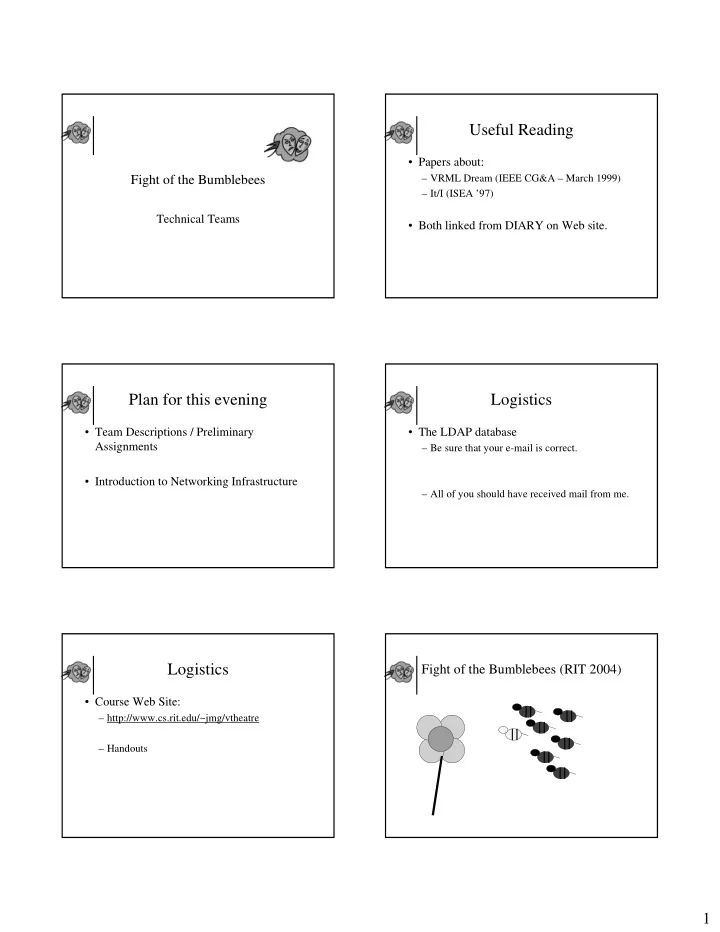

Useful Reading • Papers about: Fight of the Bumblebees – VRML Dream (IEEE CG&A – March 1999) – It/I (ISEA ’97) Technical Teams • Both linked from DIARY on Web site. Plan for this evening Logistics • Team Descriptions / Preliminary • The LDAP database Assignments – Be sure that your e-mail is correct. • Introduction to Networking Infrastructure – All of you should have received mail from me. Logistics Fight of the Bumblebees (RIT 2004) • Course Web Site: – http://www.cs.rit.edu/~jmg/vtheatre – Handouts 1
MUPPETS Technical Teams • The Multi-User Programming Pedagogy for • Team MUPPETS (audience) Enhancing Traditional Study • Team CAVE (stage manager) • Team FLOCK (flocking model) • Developed in IT (Andy Phelps/Kevin Bierre/ Dave Parks) • Team MERRY MELODIES (music / audio) • Team VR (actor – lead bee) • A Collaborative Virtual Environment • Team INFRASTRUCTURE (networking) • Java based integrated development environment • http://muppets.rit.edu/ Team MUPPETS (audience) Team MUPPETS • Main viewing app • Dennis Colburn (audio interface…still – Display stage, actors, staging registered?) • Multiple audience members • James DiCamillo • Import Maya objects / animations • Jon Heise (networking interface) – Cueing object definition (with Team CAVE) • Audio – Music • David Parks – (in conjunction with Team MERRY MELODIES) • Audience participation • Event Response – Actors, staging, audio Team CAVE (stage manager) Team CAVE (stage manager) • Hardware setup /networking of UT-CAVE in Breakout Room 2. • Main viewing app in UT format – Display stage, actors, staging • Import Maya objects / animations – Into UT format – Cueing object definition (with Team MUPPETS) • Networking from Java to UT • Event Creation – Controls for staging • Event Response – Actors, staging, audio (probably not) 2
Team CAVE Team FLOCK (flocking model) • Lomax Escarmant • Emotive motion • Draft choice -- Christopher Boyd (?) • Flock object – Interoperate with team MUPPETS – Interoperate with team CAVE • Event Response – From lead-bee Team FLOCK Team MERRY MELODIES • Kathy Law (Emotive motion) • Emotive Music • David Rusbarsky (Flock Object?) • Audio/Musician “object” – Event Response • From lead bee – Interoperate with Team MUPPETS Team MERRY MELODIES Team VR (actor – lead bee) • Ryan Becker (emotive music) • Dennis Colburn (MUPPETS interface…still registered?) • Christopher Boyd (? MUPPETS interface?) 5DT Data Glove I-glasses Head Mounted Display w/head tracker 3
Team VR (actor – lead bee) Team VR (actor – lead bee) • Hardware • James Tranovich – Get HMD and Data Glove working • Draft choice (Damian Eads?) • “Actor” object – Generate events (from data glove) • Viewer App – In conjunction with team MUPPETS – C to Java conversion (if required) Team INFRASTRUCTURE Team INFRASTRUCTURE • Basic networking to be done in Java • Roderick Campbell • Implementation of VT networking classes • Jon Heise (MUPPETS interface) – Thin wrapper over M2MI • Event recorder – For offline rendering – Test for network traffic Draft Choices Logistics • Because of too little or too much info: • Access to Breakout Room 2 – Damian Eads (Team VR?) – Ryan Kidder (Team CAVE?) – Christopher Boyd (MELODIES or CAVE) • MUPPETS on ICL6 and BOR2 machines. – Joe Spears (are you registered?) • Joe Geigel • Talk on MUPPETS – Overflow – common interface specification – Student Availability…after class or Friday? • Event heirarchy • Cueing object. – Others as needed. 4
Networking Philosophy M2MI • Components should be loosely coupled. • Many-to-Many Invocation • Serverless protocol – Anhinga Project (A. Kaminksy/HP Bischoff) – Java based networking library – Broadcast – Serverless broadcast model • Ridiculously simple programmer interface. – http://www.cs.rit.edu/~anhinga • Observer Design Pattern – EventGenerators – EventListeners M2MI M2MI • Small mobile computing devices • Object oriented abstraction of many-to- – Not much CPU, memory, battery life many communication • Proximal wireless networks – Broadcasting is inherent • Ad hoc networks – Automatic network configuration • Collaborative applications – Chat, groupware, file sharing, sensor networks, . . . • Many-to-many communication patterns – Every device talks to every other device M2MI Handles M2MI Handles • Handles (remote references) – Omnihandle: Refers to all objects that implement an interface – Multihandle: Refers to a group of objects M2MI.export (a, Foo.class); that implement an interface Foo allFoos = (Foo) M2MI.getOmnihandle (Foo.class); – Unihandle: Refers to one object that allFoos.y(); implements an interface 5
VT Networking VT Networking • Event “classes” • Event Generators – ActorEvents – Invoke sendEvent method on all event listeners – FlockEvents • Event Listeners – AudioEvents – Will receive event messages and respond – AudienceEvent appropriately – StagingEvent (include startPerformance/cues) • Usually 1 generator / many listeners for • Each event sent will have reference back to each event type object that sent the event VT Networking VT Networking • Simple programming interface • Simple programming interface – For all – Distributed Performance object • Performance.register(this); – For event generators • Perfomance.broadcast(someEvent); • Calls on each listener L – L.eventHappened (someEvent); – For event listeners • Listener Types will be interfaces • Must implement eventHappened() VT Networking Job of teams in coming week • Determine if component is • Will not use M2MI directly. – Event Generator – what kind of events • Performance <-> M2MI should be straight – Event Listener forward • What kind of events • What will be the response • Job of Team INFRASTRUCTURE. • Determine set of tasks / deliverable – Develop schedule for checkpoints • Set up team Web site 6
Questions? For next time • Send me e-mail – Yea/Ney on current assignment – Final team assignments will be ready on Monday. – Team organization to occur on Monday. • Start thinking about events and deliverables. – Complete Event Hierarchy / interface presented on Monday. • Questions? 7
Recommend
More recommend